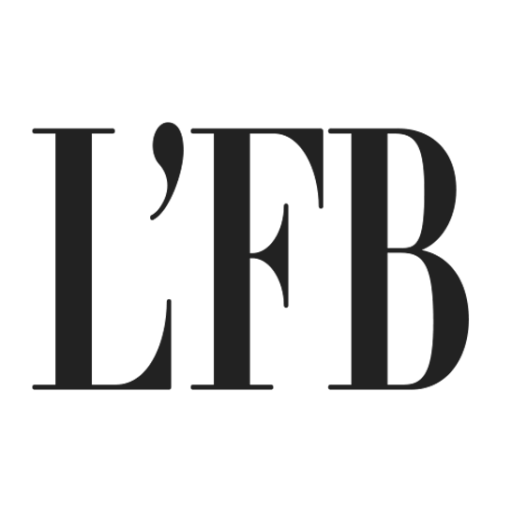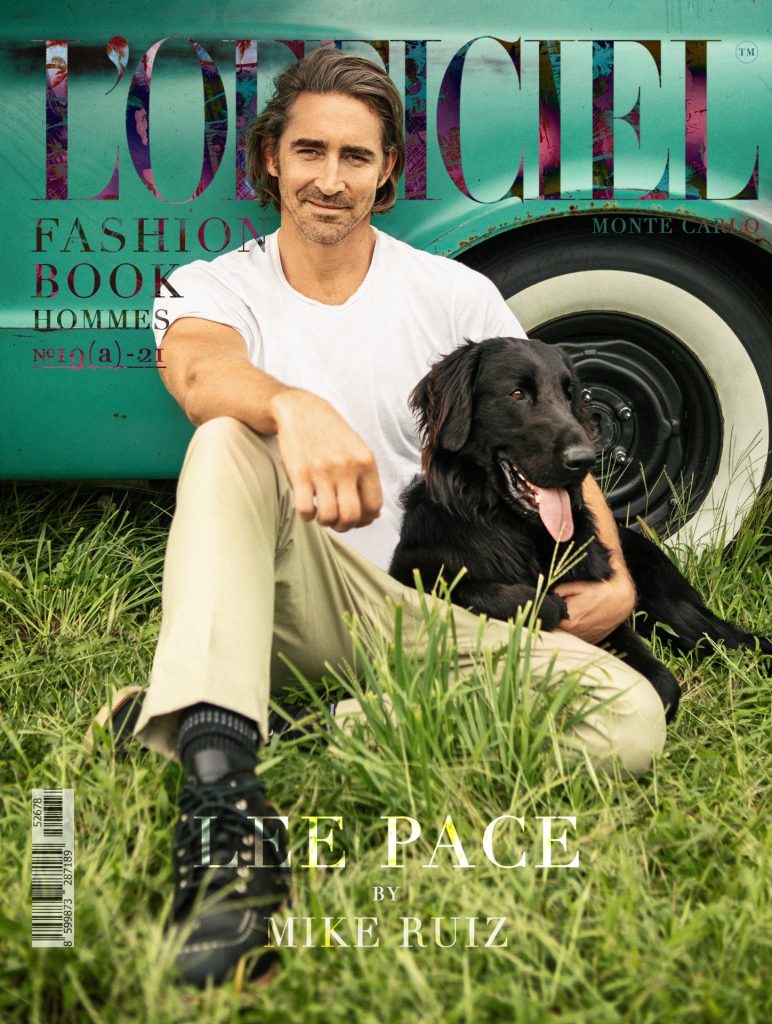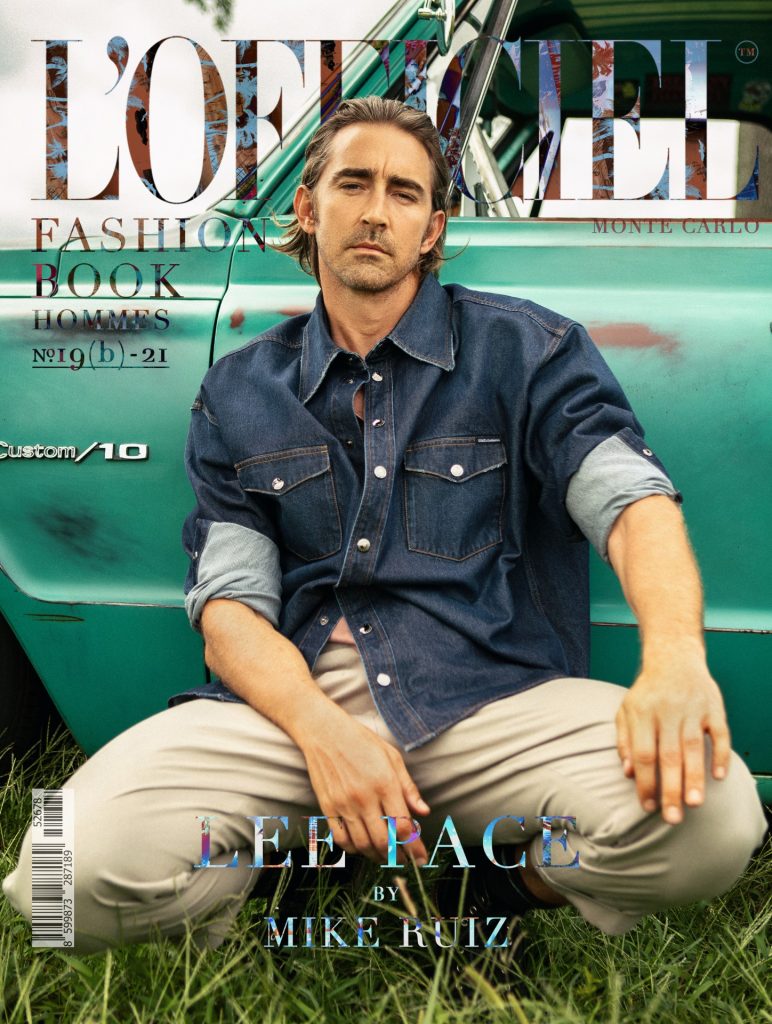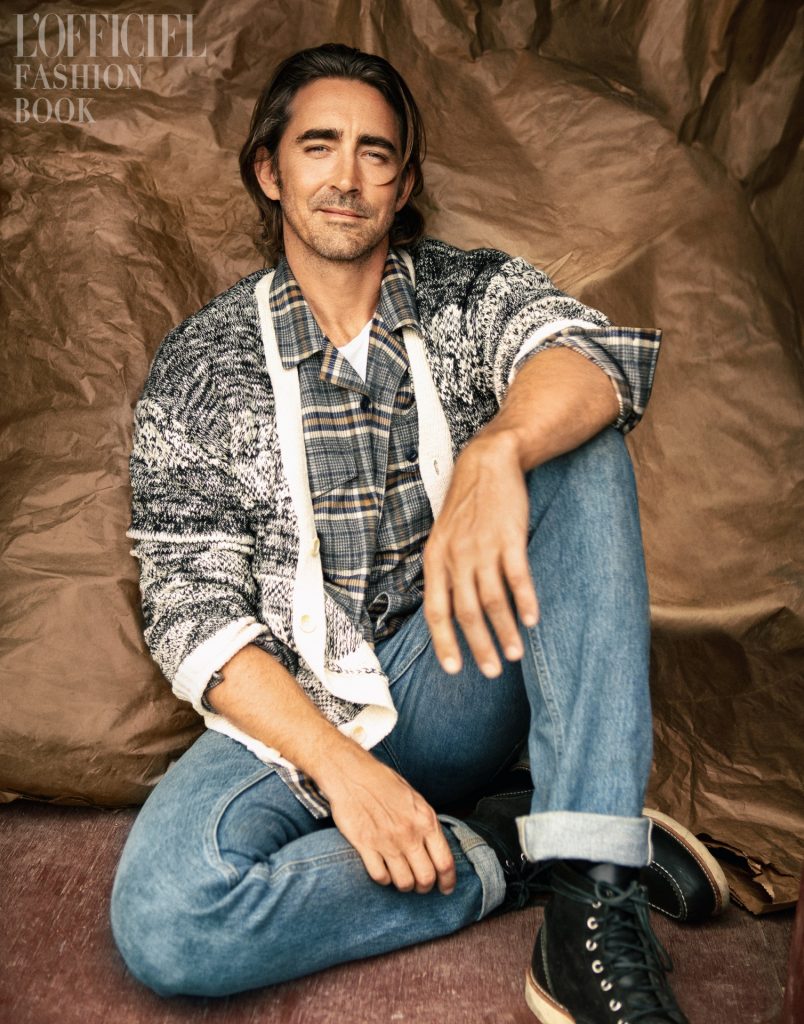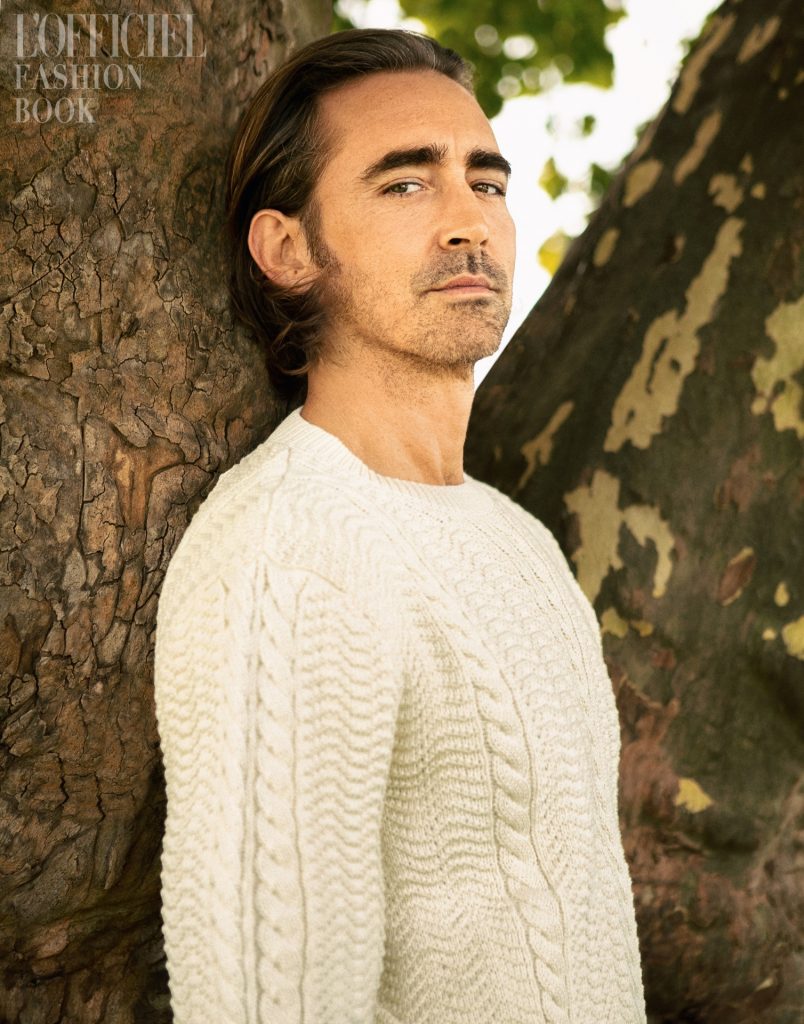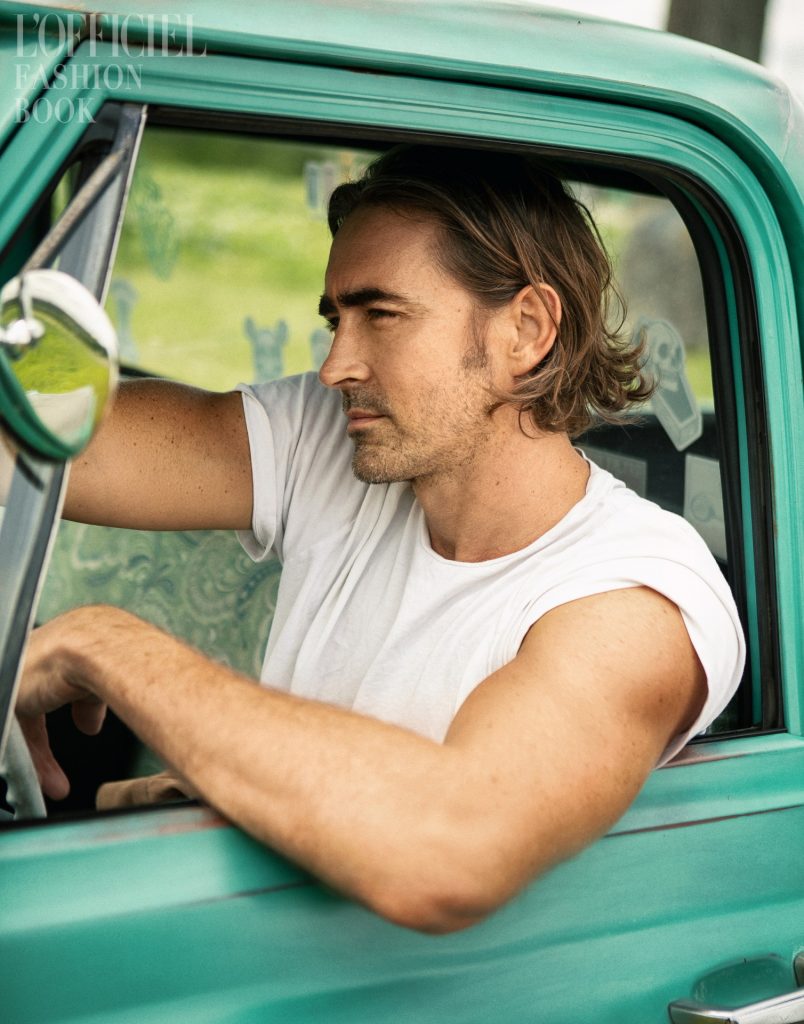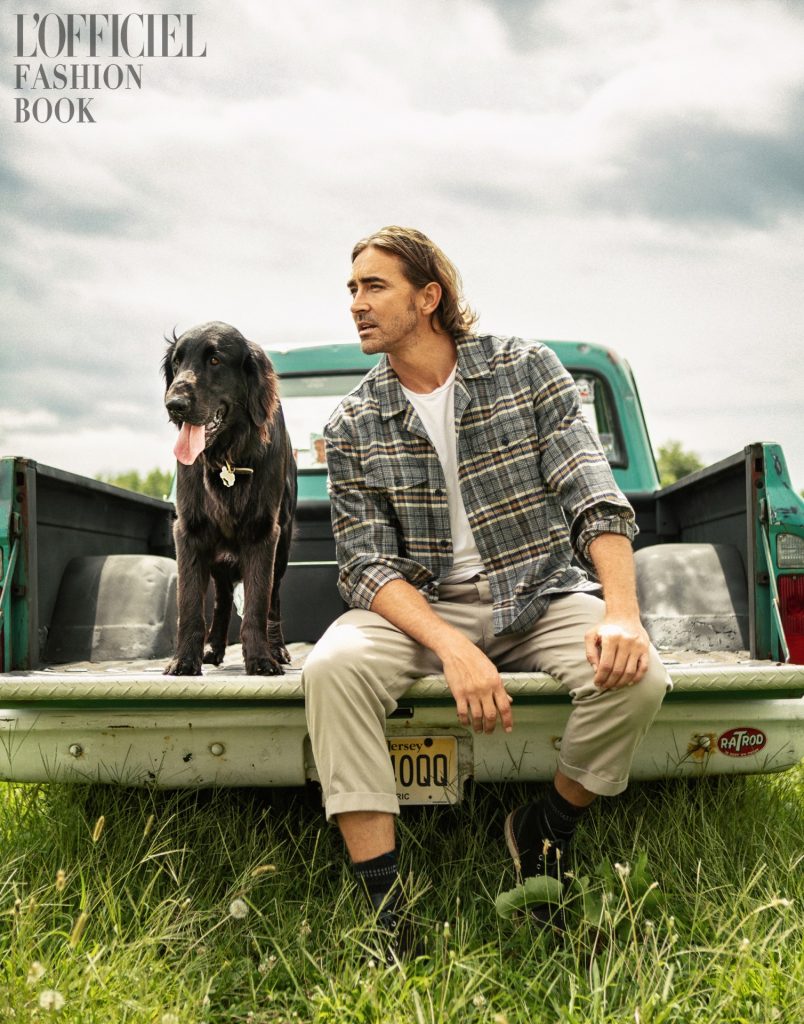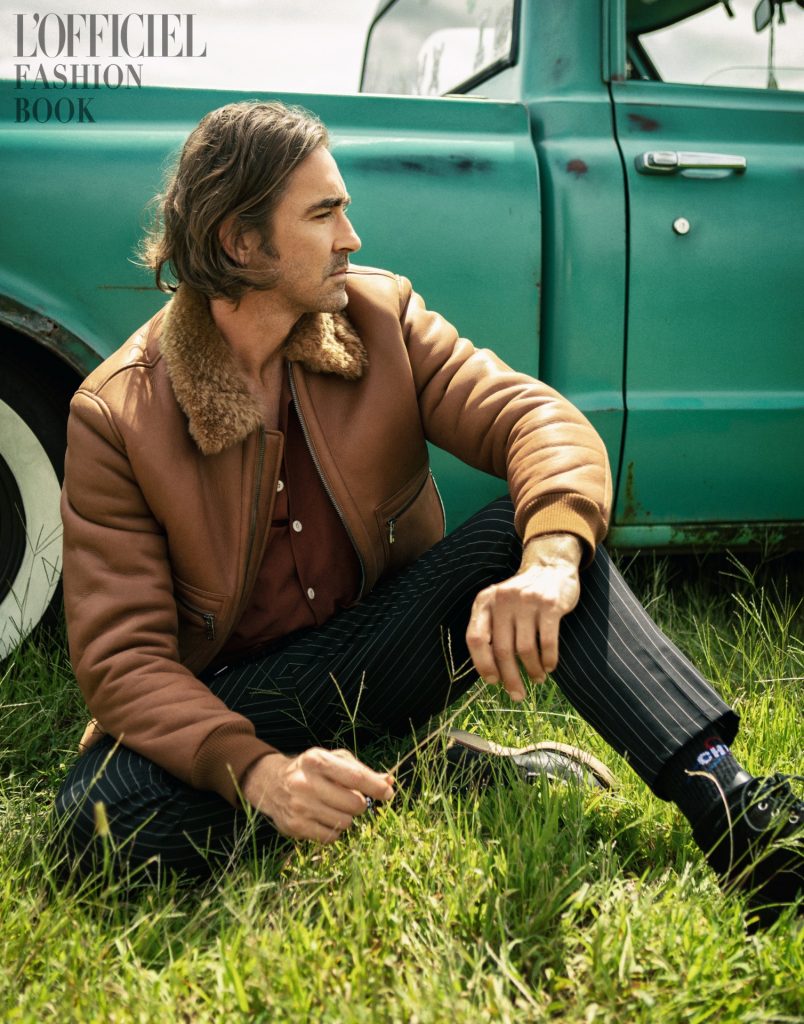Lee Pace
“FOUNDATION”
Photoshoot / Interview
photoshoot
Talent: Lee Pace
Photography, Creative Direction,
and Production by: Mike Ruiz
Editor-in-Chief: Dimitri Vorontsov
Stylist: Chloe Harstein
Groomer: Kumi Craig
Special thanks to Dan Keane
Photo Assistant: Dani Sax
interview
by Dimitri Vorontsov
Were you a fan of Isaac Asimov before signing up for the show and who are your favourite sci-fi writers?
I was a fan of sci-fi and the Isaac Asimov tradition of sci-fi, but I say that to say that I was extremely familiar with Dune and Hyperion. Ursula Le Guin is one of my absolute favorite writers. I would say in the top three of any writer of any kind of genre. I read the first book in the Foundation series about a year before I heard that they were making it into a series and I thought, like everyone else, “There’s no way they can do this.” I was very much like, “There are no characters that you can fall in love with. There are certain things that it’s just better to read and imagine.”
I will say, when I got the script, I was so impressed with the investigation David (S. Goyer) had done on the space between the stuff that the book covers, it’s like, he’s able to take the monumental things that affect the story, happening offstage and mentioned very briefly, and he goes into such a full-bodied investigation and brings it to life in a way that it elaborates on what the characters in the stories — It’s a different pleasure, do you know what I mean? It’s looking than reading the book, I would say.
It’s a grand idea by David S. Goyer, well done. How long did it take you for the full production?
We had to shut down for COVID. I know that everyone kept thinking about it. I know I spent all my time, a lot of my time, during our COVID quarantine, I cleared off a little space in my barn and did yoga, and started really taking my yoga practice seriously. In doing that, I was able to think about the character and think about the worlds that we were in in a way that really opened some doors for me creatively. It made me able to not need to the conclusion inside the story and inhabit the character in a way that I hope allows the audience, the room, to interpret him and the riddle that the character like this genetic clone poses.
Kleon created the “Genetic Dynasty” so the galaxy would always be ruled by one of Kleon clones perpetually. Your characters are called brothers Brother Day, played by you, Brother Dawn (Cooper Carter), and The elder Brother Dusk, (Terrence Mann) who provides counsel to his younger “brothers,” but in reality all the same godly like person at different stages of life. Can you tell us about how your characters are synced together to portray the same god in synergy?
It was a big, big question for us, too. We were like, “This is something we have to get right.” Like I said we’re doing it inside the performance. We want to make good on that opportunity to not rely on CGI to tell the stories of these clones. Inside the performances that we’re doing, Terry… It’s like I’m working with doctors who are down for the same work that I’m down for which is letting it be physical. Paying attention to each other so that… It became a game that we would do at dinner in getting Cooper Carter, watching him, copying him.
Letting him notice that he’s being copied and then he would start doing it to us in a way that we started to figure out just by playing, basically, what that culture is, that their mirror gestures indicate? There’s nothing genetic about moving the same. That’s the culture inside that family, and that’s what I find very interesting about Dawn’s struggle which I think we have to believe is was Dawn’s struggle growing up because we saw it.
We saw him as a little boy being uncertain and unclear about how to interpret Hari Seldon, how to interpret the executions. Didn’t know who he was and what this role was that he was inheriting. Then we see it a generation later, and Dawn is, yet again, still trying to live up to the example of his ancestors. It’s like there’s this reality that you cannot escape your destiny. You’re never alone in a room. You’ve got every generation that came before you, present with you. I think it takes that abstraction and traumatizes it in a way that I find really really powerful and interesting. Dave literally looks at Dusk and thinks you’re me, you’re me. I’m watching myself but advanced a bit.
Your character had one of the most powerful lines towards the second part of the season. Your character said, “He is my brother he is also my son, I rocked him as a baby, it’s a powerful thing carrying for a life.” What does it mean for your character? Do even antagonists have feelings?
I think he’s violent. He’s extraordinarily violent. I think that does make him a pretty bad guy by most standards. People who resort to violence as a proportion with which he does, I think make him pretty seriously bad. I think a very subtle thing happens inside the character’s mind. It may be subtle perhaps because he is the emperor of the galaxy and he has the chi, the power that he holds, that subtle thing is magnificent and huge and scope. I think what he realizes is that he’s not the emperor of the galaxy.
He’s just a flesh and blood man. He hasn’t cheated death. He’s got one life, and it is a singular life. No one else will live it. No one else will know what it was to be this emperor here and now today responding to the events of the star bridge, responding to Hari Seldon’s prophecies. “I am not a continuation of a man who has cloned himself. I am a soft-skinned human who is balancing the weight of the galaxy on my shoulders, and the odds are I’m going to fail.”
I think that’s what he comes to in the story and removes the idea that he’s the Emperor of the Galaxy. I know a lot of people who behaved just like the emperor of the galaxy in my life here in New York, who think that they have control of their life, who cannot help themselves from putting pressure on the people around them to follow their instructions to control them, to control their circumstances. Any loss of control results in domination. I think everywhere you look, you see that kind of thing happening in our contemporary life. Which stories do and which stories of these that have obstructed those dynamics, allow us to think about them and feel our way through them in a way that is entertaining, and it doesn’t have all of those triggers that we get caught up on when thinking about those individuals who are here on earth who take up too much space?
Your character walks the Path of Enlightenment through the deserts which is rather unusual for your character considering the stature. How important do you think that episode is for Brother Day to be the first Emperor to walk the Path of Enlightenment?
I think it’s a pivotal, pivotal, pivotal moment. The pivotal change that happens within him. I think it’s in response to everything we’ve seen this season, Hari Seldon’s math, the Star Bridge, this is his response to it. I think we see him have a character that his resistance to change is so severe that he cannot be beaten. You can’t beat him. You can never beat him. He’s incapable of it. He’s incapable of being bested, and he knows it. That’s the thing, he knows it. He knows looking at it, “I’m going to come out of this thing on top one way or the other.” I think that that is a very unique kind of curse and struggle that he has, and it will prevent him from embracing the change that time will force him to embrace.
I think that thing shows him, it takes him right to death, death’s door. It strips him of his ego that he was previously relying on. Just some of the fantasy that he is the emperor of the galaxy. What is he left with? That’s where that I think you see the man walk out of episode 8, and in 9 and 10. Who is he now that he’s been stripped of all those fantasies? The fantasies’ role? What is he going to do next? That becomes, really, what’s interesting. What happens now? Because you can’t unsee what you’ve seen.
The series features another major character Hari Seldon played by Jared Harris. Can you tell us if we see Brother Day and Hari cross path again?
What I would say is, anything is possible in this time and space. I think it’s a mash-up I would like to see again, as a watcher, a consumer of the show. I would like to do that mash-up again, and see how they respond to each other with more water under the bridge. First of all, what a privilege to work with Jared Harris, but I think that I love — Both of these characters have an understanding of their own immortality inside of that first scene.
I think they’re both looking at each other thinking that the card that they hold that the other one doesn’t, is that, “I live forever.” Hari Seldon knows what is about to happen throughout the rest of this season and the ways in which he’s going to cheat death. Kleon knows the way they’ve always done it, that he may be gone, but he will still be here, 100 years from now, 500 years from now, solving the problems that Hari Seldon is screaming about.
I think he’s looking at everything Hari Seldon’s saying, and he’s saying, “Yes, what do you think we do all day? Yes, there will be a major exhortation from one of their huge religions and we will deal with that like we always have dealt with it. What do you think we do except to keep the balance and we’ve been doing a really good job of it.” This is ego. Again, this is ego. I’m curious to know how when more things happen to Emperor, how the dynamic between him and Hari Seldon has changed. They’re playing a game of immortality.
Can you tell us about your character’s relationship with Demerzel, played by Laura Birn. She is the closest confidant and caretaker of all Kleons and was around for 11,000 years. She is the last remaining intelligent robot but yet she developed feelings?
I think it’s unique to any other relationship that I have ever seen on TV or film or read in a book, this idea that she has raised them, she’s cultivated them, formed their minds, she’s their confidant, she manages this extraordinary responsibility for him, can be managing the competing priorities of the Empire. She sees them through their life and death. She’s the most intimate person to them. I think that it is unique in so many different ways.
Working with an actress like Laura who’s so gifted, and she’s so specific in what she’s trying to do with the character and so openhearted. I cannot say enough nice things about Laura. What is specifically interesting about this relationship is that neither one of us has ever seen anything like this before. I think that to sum it up, the waters of the relationship run deep, it is a deeply emotionally, dependent relationship. She’s more than a mother, she’s more than a lover, she’s more than family, she is their whole world in a way.
There is a line from one of the opening scenes – “History is the ultimate weapon as it can harvest the time itself. Used correct the past can alter the present. What other invention can do that?” Sci-fi or reality those are some really powerful words. Is this taken directly from one of the books?
It’s not a book report.
Of course…
That’s not anything I would have signed on to because you want to bring something to the screen that makes real use of the technology available at the time. Film is one of those places where you can really advance the technology. When I was doing the Hobbit, Peter Jackson was shooting in 3D, at an accelerated frame rate and shooting in 3D on the camera. That wasn’t added in the post-production that was done in camera and with that accelerated frame rate, it was the first time I’ve been on a set where someone does. Someone like Peter Jackson is developing technology with cinematography and David Goyer and Apple are absolutely doing that with Apple.
Their blending of real locations and CGI extensions into the skies and the balance they’re finding between shooting models, shooting, like I said, real locations for, it’s like they’re developing film techniques to tell the story. I think that’s part of what it is to be contemporary with the stories that you’re telling. Shakespeare, he wasn’t the first person to interpret it. I already sound pretentious, so please forgive me… Juliet, it wasn’t the first time that story was told. I think a foundational classic the Foundation, it’s respect to the door that he opened for so many other writers like Dan Simmons, Ursula Le Guin, George Lucas, so many other thinkers in the world of what happens to humans when they get off the confines of planet earth, what kind of stories can we tell and how big can we allow this canvas to go?
I think it’s a respect to him to bring all of our technology to it now, and really, not just retell the story, but challenge all the areas of cinematography, and cinema that we can’t do it. We don’t have to do it. We can tell the story in three hours easily. Now, we’ve got episodes, we’ve got 10 of them in season, we’ve got the full season, potentially, we have more than one season. There are lots of different shapes with which we can explore these characters and these ideas. I would just repeat that it’s respect to Isaac Asimov for doing it.
Isaac Asimov has left us with a vast amount of material to work with, even going into the prelude. There are seven books really to play with. It’s quite amazing. It depends on, of course, on Apple, what they can do. Hopefully, we can see more.
I’ve got for you right now, the prelude to Foundation. This is Isaac Asimov. I went through with this first edition. I think it’s the second edition of the book. Here’s what the author’s note begins with. It says, “When I wrote “Foundation,” which appeared in the May 1942 issue of Astounding Science Fiction, I had no idea that I had begun a series of stories that would eventually grow into six volumes and a total of 650,000 words (so far). Nor did I have any idea that it would be unified with my series of short stories and novels involving robots and my novels involving the Galactic Empire for a grand total (so far) of fourteen volumes and a total of about 1,450,000 words.”
He goes on to say, “Read it in whatever order you want. If you want to start the book from the first book that I wrote, or if you want to start the book from Prelude to Foundation, you take in this story however you want.” That shows, to me, a mind creating these stories being to the audience, “You’ve got a part to play in this as well. You have the poise, you have agency inside this world,” and I certainly feel that way in our rendering of that story.
Can you tell us about the locations where were you filming such excellent futuristic scenes for the Foundation?
We started in Iceland, and then we went to Berlin, and then in Ireland where we shot a lot of our stage stuff. We shot at Trinity College in Dublin, we shot at Powerscourt, which is a very old garden. We then moved on to Malta, and we shot in the water, we shot in some incredible ruins in Malta. Then the Canary Islands, which is where I shot the spiral. I love the Canary Islands. What a beautiful, beautiful place. The cleanest beaches I’ve ever seen. You wouldn’t see a soul on it. Maybe that was because of COVID, but it was just such a peaceful and wonderful lifestyle they have there on the Canary Islands. Yes, that’s where we shot those scenes. I feel like so much of what we shot, is on the screen. In those spiral scenes, all of that’s real, not CGI. Yes, you can see a faint representation of the gas giant in the background, but it’s all real. The cave, that’s real that’s and it looks like that, extraordinary.
If you had a chance to give your younger self advice, what it would be? I don’t mean calling Cooper Carter, your Brother Dawn, and giving him advice. What it would be if you had a chance?
What a great question. I would probably tell myself to get comfortable because I have a lot on my mind. [laughs] I would have a lot to say, but I’m going give you a concise answer. I would say that there’s nothing better than being relaxed. That it’s not just a luxury to be relaxed and to make being a relaxed person a priority in your life, it’s key. I think about times in my life when I was worried about one thing or another or trying to control one thing or another that was not really inside my control.
I’m feeling now, in my life, coming out of this experience of COVID, and traveling under the regulations of COVID, and everything, a real sense of gratitude and perspective, and thinking about death and health and how important health is, and being a relaxed person.
Thank you for bringing your puppy, Gus to the photoshoot. There a quite a number of beautiful photographs with him.
He will be very pleased to appear in a magazine! He’d be honored.
Gus, is he a rescue dog?
No, I didn’t rescue him. The dog before him I rescued, got him when he was a puppy.
Oh, okay, okay. We love dogs, and you know Mike Ruiz, he’s such a massive advocate for Pitbulls. It’s great that you that you brought your puppy to the set.
Oh, I love it. I’ve never not had a dog in my life because that is my favourite thing, having a dog to get out of bed, feed the dog, walk the dog, make coffee, see how the dog’s feeling, impressive thing. [laughter]
